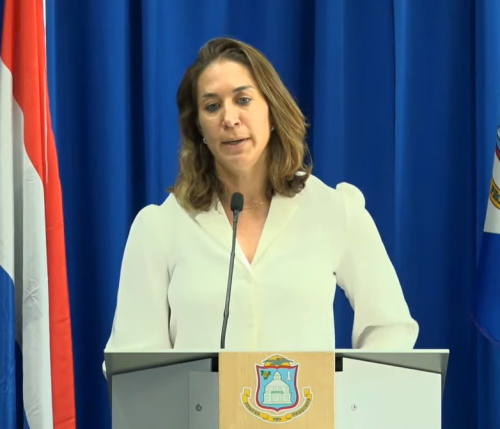 PHILIPSBURG: --- Minister of Justice Nathalie Tackling officially introduced the Detention Sector Reform Program (DSRP) during Wednesday's press briefing, unveiling a comprehensive initiative aimed at transforming Sint Maarten's entire detention system. The program signals a major shift towards modernizing infrastructure, enhancing rehabilitation, and embedding principles of human dignity and fairness into the country's justice framework.
PHILIPSBURG: --- Minister of Justice Nathalie Tackling officially introduced the Detention Sector Reform Program (DSRP) during Wednesday's press briefing, unveiling a comprehensive initiative aimed at transforming Sint Maarten's entire detention system. The program signals a major shift towards modernizing infrastructure, enhancing rehabilitation, and embedding principles of human dignity and fairness into the country's justice framework.
"After 35 years, our detention facility has outlived its purpose," Minister Tackling stated, referencing the recent anniversary of the prison's opening. "It no longer reflects the standards or the values that we, as a country, believe in. Today, that commemoration becomes a turning point, the beginning of a new chapter for Sint Maarten’s justice system."
The DSRP is an overarching program designed to address every stage of the detention chain, from pre-trial processes to post-detention reintegration. According to the Minister, the initiative will coordinate efforts to build a modern and safe facility, strengthen rehabilitation programs, improve staff working conditions, and ensure detention is managed with accountability.
This reform is a collaborative effort led by the Ministry of Justice on behalf of the Government of Sint Maarten, in partnership with the Ministry of the Interior and Kingdom Relations (BZK) and the National Recovery Program Bureau (NRPB). A key component of this partnership involves technical expertise from the United Nations.
Minister Tackling detailed the roles of two UN agencies. The United Nations Office for Project Services (UNOPS) will manage the infrastructure component, overseeing the design and construction of a new, humane detention facility that meets international standards.
She emphasized that local subcontractors and suppliers will play a significant role, ensuring the project also benefits the local economy.
Simultaneously, the United Nations Office on Drugs and Crime (UNODC) will focus on the "soft" components of the reform. Their work will include developing tailored rehabilitation and reintegration programs for inmates, enhancing staff training, and strengthening management systems. "Through their expertise, Sint Maarten will have access to best practices from around the world while ensuring that the programs designed fit our local context and needs," Tackling explained.
Despite the international collaboration, the Minister stressed that this is a "locally owned reform, designed for our people, built on our priorities, and implemented under our leadership."
Minister Tackling's vision extends beyond new construction. "This reform is not only about building a new facility, it is about building a fairer, more humane system of justice," she remarked. "I believe the way we treat people in detention says a great deal about who we are as a society. A justice system that only punishes cannot create progress. A justice system that teaches, supports, and rebuilds can."
The program is already in motion. The Minister confirmed that UNOPS has finalized the technical design and planning for the new facility, with groundwork laid to begin construction within the next three months. Furthermore, UNODC teams are currently on-site, conducting
assessments with justice staff to shape the new rehabilitation and capacity-building programs.
In the coming weeks, UN representatives will continue to meet with prison staff, whose insight Tackling described as "essential to making sure this transformation works in practice, not just on paper."
In her closing remarks, Minister Tackling positioned the DSRP as a long-term investment in the people of Sint Maarten. "This is a shared commitment, and it is a good step forward," she concluded. "This is not just the end of a long journey; it is the start of a new standard for how we approach justice in this country."












